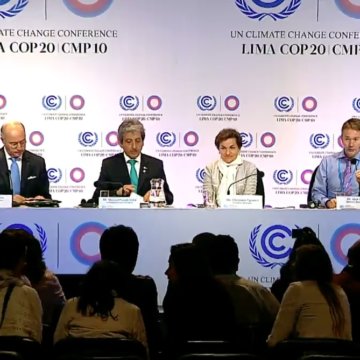- About
- Topics
- Picks
- Audio
- Story
- In-Depth
- Opinion
- News
- Donate
- Signup for our newsletterOur Editors' Best Picks.Send
Read, Debate: Engage.
The Lima Climate change conference has been greeted with muted applause; a minor success in actually cutting greenhouse gases, but a fairly big one in negotiation.
The plan, agreed at the UN is considered to lay the foundations for a final deal in Paris next year. While critics of the plan have decried the modesty of its reach- that the deal in Liam doesn’t nearly do enough to tackle climate change and leaves too much to be agreed in Paris- an interesting feature of the negotiation was the two day extension the plan was given.
The UN failing to adhere to a negotiation deadline is nothing new, but often, as is the case with talks in the World Bank, the UN allows rich, developed countries (particularly the US and EU) to form blocs and negotiate powerfully against developing countries, and even hem powerful emerging nations such as China into difficult negotiating roles.
The Lima plan did something different, as this article from the Guardian shows. The talks resulted in a plan in which all countries, rich and developing, would develop more complex metrics to describe their roles in the world- one that takes account of their contribution to global warming- and pledged all countries to climate change action.
This is a milestone in negotiating organisation- in former times, the US and EU would simply bully the rest of the world into a negotiating position; now they have sketched out their own responsibility to the world in terms of climate change and weakened their ability to dictate to smaller nations. It also has given a platform for wealthier countries to hold rich nations accountable for their emissions- and criticise their failure to provide promised climate aid.
While this may mean that the talks in Paris will certainly be messier- each nation for itself- at least we can hope for a global deal on climate change, and not simply the old story of the rich vs. the poor.
